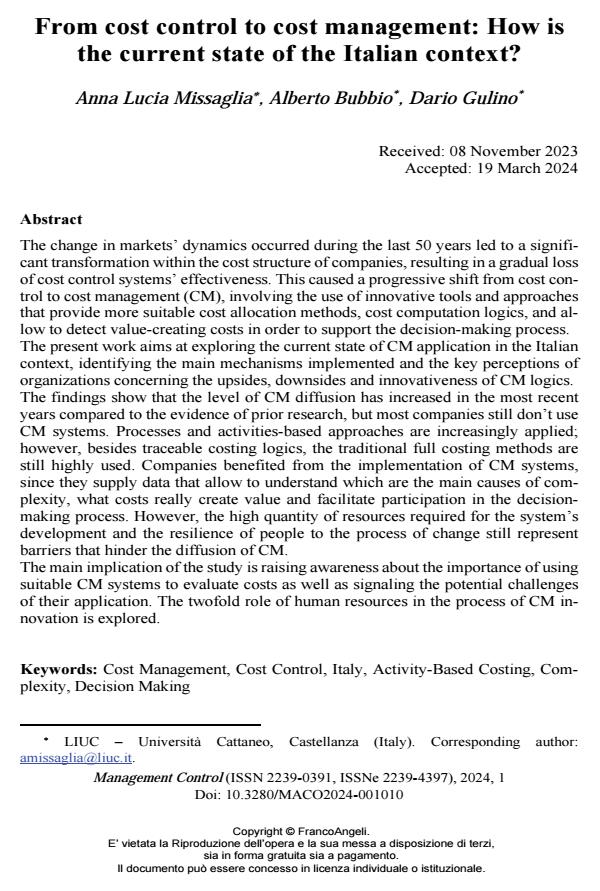From cost control to cost management: How is the current state of the Italian context?
Journal title MANAGEMENT CONTROL
Author/s Anna Lucia Missaglia, Alberto Bubbio, Dario Gulino
Publishing Year 2024 Issue 2024/1
Language English Pages 24 P. 203-226 File size 298 KB
DOI 10.3280/MACO2024-001010
DOI is like a bar code for intellectual property: to have more infomation
click here
Below, you can see the article first page
If you want to buy this article in PDF format, you can do it, following the instructions to buy download credits

FrancoAngeli is member of Publishers International Linking Association, Inc (PILA), a not-for-profit association which run the CrossRef service enabling links to and from online scholarly content.
The change in markets’ dynamics occurred during the last 50 years led to a signifi-cant transformation within the cost structure of companies, resulting in a gradual loss of cost control systems’ effectiveness. This caused a progressive shift from cost control to cost management (CM), involving the use of innovative tools and approaches that provide more suitable cost allocation methods, cost computation logics, and allow to detect value-creating costs in order to support the decision-making process. The present work aims at exploring the current state of CM application in the Ital-ian context, identifying the main mechanisms implemented and the key percep-tions of organizations concerning the upsides, downsides and innovativeness of CM logics. The findings show that the level of CM diffusion has increased in the most recent years compared to the evidence of prior research, but most companies still don’t use CM systems. Processes and activities-based approaches are increasingly ap-plied; however, besides traceable costing logics, the traditional full costing methods are still highly used. Companies benefited from the implementation of CM sys-tems, since they supply data that allow to understand which are the main causes of complexity, what costs really create value and facilitate participation in the de-cision-making process. However, the high quantity of resources required for the system’s development and the resilience of people to the process of change still represent barriers that hinder the diffusion of CM. The main implication of the study is raising awareness about the importance of using suitable CM systems to evaluate costs as well as signaling the potential chal-lenges of their application. The twofold role of human resources in the process of CM innovation is explored.
Keywords: Cost Management, Cost Control, Italy, Activity-Based Costing, Com-plexity, Decision Making
- Cost analysis for telemedicine services: A scoping review of literature on the cost-benefit approach Luca Del Bene, Cecilia Menegon, in MANAGEMENT CONTROL 3/2026 pp.137
DOI: 10.3280/MACO2025-003007
Anna Lucia Missaglia, Alberto Bubbio, Dario Gulino, From cost control to cost management: How is the current state of the Italian context? in "MANAGEMENT CONTROL" 1/2024, pp 203-226, DOI: 10.3280/MACO2024-001010